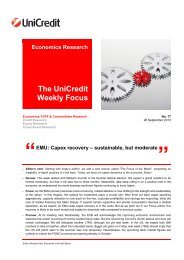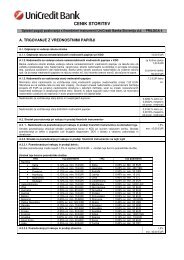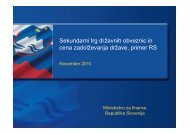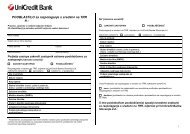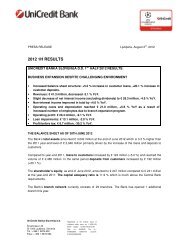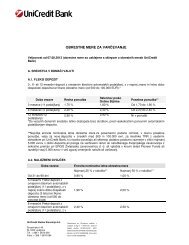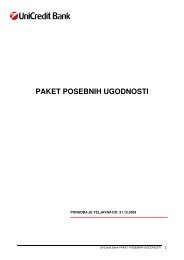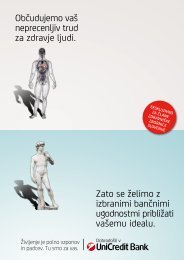Letno poroÄilo 2009.pdf - UniCredit Banka Slovenija dd
Letno poroÄilo 2009.pdf - UniCredit Banka Slovenija dd
Letno poroÄilo 2009.pdf - UniCredit Banka Slovenija dd
- No tags were found...
Create successful ePaper yourself
Turn your PDF publications into a flip-book with our unique Google optimized e-Paper software.
• On the job market, new business conditions were reflected in thegrowing rate of unemployment, which by the International LabourOrganization (ILO) standards reached a 6 % level on average andcontinues to grow, compelling the country to adopt a<strong>dd</strong>itionalmeasures of intervention and social negotiations betweenemployers and employees towards a new social agreement.• The only positive effect of new business conditions was theirimpact on the movement of prices, which started to slow downwith the decrease in economic activities in Slovenia and abroad.For the first time since Slovenia has become an independentcountry, its average rate of inflation was under 1 %; for stableprices are considered to be the fairest social policy.With such economic conditions at home and abroad, the domesticbanking system was also faced with completely different marketconditions and assumptions, compared to the past few years of highcredit growth and volume of asset growth. Among the most importantfactors affecting the banking business and our achieved results, thefollowing should be noted:• Due to distrust in the financial markets, the so called fundingwas reduced to a minimum, or more precisely, access to foreigninter-bank resources was made possible only with the state’sassistance and its guarantee. In order to maintain trust amongsavers and banking financial intermediaries, the state issued a100 % guarantee on all savings deposits of individuals, as wellas of small and medium-sized companies, with no limit on themaximum amount of deposits and with a time limit of the end of2010. This solution a<strong>dd</strong>ed to the growing ethical risk for both sidesof the partnership. At the same time, it also a<strong>dd</strong>ed to the banks’competition over which bank would offer the highest interest ratefor various types of savings deposits, thus obtaining more “primaryresources” that could be applied toward repayment of past duecredit lines and, to a lesser degree, for a<strong>dd</strong>itional credit resources.The initial outcome of this has been more expensive credits forretail clients and businesses.• Also, the economic and financial crisis has had an impact onthe existing credit relations and other business relations betweenthe bank and borrowers, as well as between borrowers and theircontractual partners. With the general decrease in demand therealso occur delays in payments, illiquidity, and even insolvency,which affects banks in terms of impairment of receivables, theability to create a<strong>dd</strong>itional reservations, and the modificationof existing agreements from the point of view of time of creditrepayment as well as of other credit terms. It can be concludedthat in general the Bank’s activities and efforts in 2009 wereoriented towards this type of activity with the goal of finding asuitable modus vivendi for both contractual partners. These types<strong>UniCredit</strong> Bank · 2009 Annual Report 121



